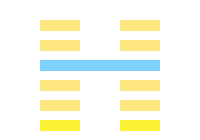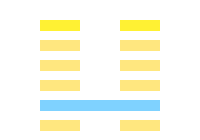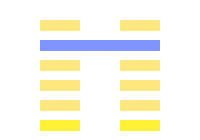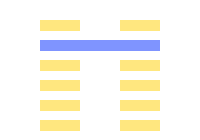Validating Comments
Updated: Sunday, 13 October 2019
When I started studying the I Ching, I promptly realized that the hexagrams were describing situations. The comments associated with each hexagram and line either give proper advice, or describe the situation and eventually predict its outcome.
This is how I started studying, situation after situation, until I came to a stop because there were situations that I could not resolve, comments that I could not understand. 13.1 is one of these, I could never understand what it was about. At some point I could not progress anymore.
Then I have stopped studying the I Ching for 10 years, and when I returned (long story short) I asked the oracle to give me its own titles and comments for the hexagrams and the lines. The multiple lines comments came after. And then, many of the lines I could not understand appeared much clearer, but at the same time some situations that I thought I was understanding crystal clear became less obvious, for example 8.1.
So there were some gains and some losses, but overall, my understanding of the I Ching has tremendously evolved. And then I've wondered if it was possible to prove these comments to be true, how would I proceed to do that?
Two ways of validating comments
One can validate comments and titles by using structure or readings. If you choose to validate them with the hexagram structure, you don' t rely on anything else than the other comments for different hexagrams. Validation with readings suppose that you have access to a large base of readings, preferably with enough background and also the outcome, what happened in the end. Such base exists on the internet, but you can also use your own readings if you have enough and documented them sufficiently.
Validation with structure
When I was a young I Ching student, I was annoyed by 63.4 because it was warning of a danger but didn't propose a solution.
The finest clothes turn to rags.
Be careful all day long.
It is fine and dandy that I should be careful all day long, but there should be something to do about it, don't you think? I've read more about it in Richard Wilhelm and Da Liu's books, and I got some hints about a boat having leaks that one could fix with rags, and also about the bottom of a dress getting wet. So, I reflected that if the boat presents leaks, it would be better to take another or at least to put it on a dry dock to fix it rather than using rags. Likewise, if the bottom of my clothes get wet, I can return home and change them. And then I considered that 49.4 could be the "solution" of 63.4.
Remorse disappears. Men believe him.
Changing the form of government brings good fortune.
49.4 is this kind of situation when you tidy up your room and change the place of every piece of furniture. It's a great way to find old coins and lost papers. So, if your boat has leaks, putting it on a dry dock is very 49.4.
It turns out that 63.4 becomes 49, I've later learned that 49.4 is called the Fan Yao of 63.4. And then I wondered if each line's Fan Yao was the "solution" or the "remedy" of the said line. That would be a great way to validate line comment's don't you think?
But before doing that we should consider unchanging hexagrams first.
Unchanging hexagrams
Oftentimes, people don't understand unchanging hexagrams. What do they mean exactly? They have so many meanings!
Complementaries
There is something very simple to do about it: consider the complementary hexagram. Let's take the hexagrams 29 and 30 as example :
The situation: 29

29 - THE KHAN HEXAGRAM.
Khan, here repeated, shows the possession of sincerity, through which the mind is penetrating. Action (in accordance with this) will be of high value.
Bing DeepL Google Yandex29 - K’ân, l’abîme
K’ān : danger, précipice, caverne. — Tsa k’ān : courir de grands risques ; s’exposer au danger pour un autre.
Texte
La droiture, le coeur fidèle et attaché, réussit ; ses actes ont de l’éclat s’il persévère malgré le danger.
Symbolisme
L’eau s’étendant au loin (deux fois eau) forme le Koua. Le sage, d’une vertu constante, agit vertueusement et s’applique à l’enseignement. Il répand ses biens comme l’eau.
Commentaire
Tsa k’ān est un danger grave. L’eau débordant, mais ne remplissant pas tout (que figure le Koua), représente les dangers courus sans qu’on perde sa fidélité constante. Le coeur attaché réussit ; quand la force garde le milieu, tout ce qu’on fait est bon et méritoire. Le ciel a ses dangers qu’on ne peut surmonter. La terre a les siens dans les montagnes, les fleuves et les ravins. Les rois et princes arrangent les choses dangereuses de manière à sauvegarder leurs États. Le moment du danger est bien grave.
29 - La profondeur
Quand les problèmes sont trop difficiles, on essaie de les contourner.
Bing DeepL Google Yandex29 represents darkness, difficulties, danger and depth. It is quite easy to understand Now that we have understood that, we can infer the properties of hexagram 30: light, security, easiness, because 29 and 30 are complementaries.
The situation: 30

30 - THE LÎ HEXAGRAM.
Lî indicates that, (in regard to what it denotes), it will be advantageous to be firm and correct, and that thus there will be free course and success. Let (its subject) also nourish (a docility like that of) the cow, and there will be good fortune.
Bing DeepL Google Yandex30 - Lî, le feu
Lī : éclat, brillant, bel extérieur, succès.
Texte
Beauté, « bel extérieur », se développe et s’achève comme dans l’élevage d’un animal domestique (qui, bien soigné, est gras, beau, luisant).
Symbolisme
La lumière du soleil doublée (en dessus et en dessous) forme le Koua. Le grand homme fait ainsi briller ses qualités de plus en plus dans les quatre régions.
Commentaire
Le soleil et la lune brillent dans le ciel ; les grains, les plantes brillent sur la terre. Un double éclat brille dans tout ce qui est droit et juste et transforme, en le perfectionnant, tout ce qui existe ici-bas.
And it is true that many of the lines of hexagram 30 relate to security, specially line 3 and line 6. On the other hand, the hexagram 30 has been named Lucidity by the oracle, so 29 must be about confusion, it works both ways.
We can understand hexagram 30 just by reflecting on hexagram 29. While it is true for any hexagram pairs, some are harder to get than others.
Some of the "easy" ones other than 29 & 30 are 1 & 2, 63 & 64, and also 11 & 12. We can also easily understand 19 & 33 since one is named (Wilhelm) Approach and the other Retreat. However it is much more difficult to get some of the pairs such as 3 & 50, 8 & 14, 9 & 16, 26 & 45. They require thorough attention and I am far from being able to validate them all. As of today, I have been able to validate 8 & 14 by following the oracle's titles: Selecting recruits for 8 and Meeting demands for 14. This is how comments and titles can be validated, by considering the complementary and this is why you cannot put any name in front of an hexagram, because it has to match its complementary.
The hexagrams 41 & 42 form a kind of exception here, since they represent decreasing and increasing but are not complementary of each other. The reason can be found in hexagram 42, for it is not about being increased but about increasing others. By decreasing others one gains in influence (31), by increasing others they make them last longer (32). You can get the picture by considering a pile of sand. When shoveling it, you decrease the pile (41) and gain some sand (31), then you would drop it (42) at it's resting place (32). 41 & 42 are said to be mirror hexagrams.
As I was consulting the I Ching to get the hexagram titles, when I reached the hexagram 61, one of the first readings I got was 63.4. I took it as a warning, because the hexagram 61 is traditionally called Inner Truth, it is a beautiful concept and as such the hexagram 61 is the favorite hexagram of many, even though they don't get it always. The oracle was warning me that it would turn into something ugly, and I finally got Immobilized as title. This was causing two problems for me, the first was that it was conflicting with hexagram 52 (Keeping Still) and the second being that hexagram 61 is usually interpreted as trust. Now there are arguments in favor of Immobilized. The first is that it looks like a cage, the second is that Immobilized is the complementary of 62, which represents a bird flying, so is about mobility. The oracle gave me Exiting as title for 62, which confirms 61 as being Immobilized. 61 being the cage, 62 is the bird and we can recognize that love happens when the bird (soul) gets caught into the cage (heart). This is how we can find Inner Truth again, despite the difficulties. Even if someone disagrees about the titles of 61 & 62, we can see clearly that they fit into the complementary scheme. And if someone would like to propose different titles, or even keep Inner Truth and Preponderance of the Small, then they would have to show how inner truth is a complementary idea of the small being in excess, good luck with that!
Nuclear hexagrams
Another great way of validating an unchanging hexagram and its comments is by considering the nuclear hexagram. The nuclear hexagram is the hexagram formed by the two inner trigrams of the starting hexagram. That is, when you have an hexagram, take the lines 2,3,4 then 3,4,5 and you will get its nuclear hexagram. As I understand it, the nuclear hexagram represents the root or the origin of the situation. For the hexagram 29, the nuclear hexagram would be 27:
The situation: 27

27 - THE Î HEXAGRAM.
Î indicates that with firm correctness there will be good fortune (in what is denoted by it). We must look at what we are seeking to nourish, and by the exercise of our thoughts seek for the proper aliment.
Bing DeepL Google Yandex27 - I, l’alimentation
Ī : 1. Entretenir, soutenir ; 2. Menton, côté de la bouche ; 3. Profond.
Texte
Entretenir : achève heureusement. (Il faut) examiner soigneusement comment on entretient. On doit chercher soi-même ce qui est bon pour sa bouche.
Symbolisme
Une montagne au-dessus du tonnerre (image de celui qui réprime ses désirs, restreint ses tendances). Le sage s’observe ainsi en ses paroles et modère l’usage des aliments.
Commentaire
Entretenir sa rectitude est cause de bonheur. On doit examiner ce que l’on entretient et ce qui doit nous entretenir. Le ciel et la terre entretiennent tout ; le saint entretient la sagesse pour atteindre par eux tous les peuples. Grande est l’opportunité de l’entretien.
There is a lot to say about the nuclear hexagrams. Here we can understand that feeding oneself creates difficulties. Among the 64 hexagrams, four hexagrams have 27 as nuclear (the three others being 59, 60 and 61). So there are four possibilities given a root situation. There are sixteen nuclears of the first level, and those sixteen nuclears have four nuclears of the second level, which are 1, 2, 63 and 64. 1 & 2 being their own nuclears, 63 & 64 being the nuclear of the other. So, the need for supplies (hunger) limits us (60), creates difficulties (29), causes separation (59) and is a cause of immobilization (or capture, 61). Again, given an hexagram and its nuclear, the titles and comments need to match. This is how we can ensure that comments are valid.
Single changing line
As I have already explained, the Fan Yao is a very interesting line of research when it comes to validating line comments. Naturally it has to work for every line, and not just for 63.4 & 49.4. So, can we find other examples ?
Fan Yao
A relatively easy one is 16.1:

16.1 (16 > 51) - THE YÜ HEXAGRAM.
The first line, divided, shows its subject proclaiming his pleasure and satisfaction. There will be evil.
Bing DeepL Google Yandex16.1 (16 > 51) - Quenching one's enthusiasm
When one starts by showing their confidence they come back with embarrassment.
Bing DeepL Google Yandex16.1 (16 > 51) - Quenching one's enthusiasm
When one starts by showing their confidence they come back with embarrassment.
Bing DeepL Google Yandex16.1 (16 > 51) - Yù, la ferveur
Yú : 1. Dignité, majesté ; 2. Aise, satisfaction, jouissance.
Une dignité qui se manifeste bruyamment (ou bien : une jouissance
bruyante, 2e sens) est chose funeste.
La volonté s’épuise.
16.1 (16 > 51) - Se faire doucher
Quand on débute en montrant sa confiance on revient avec de la gêne.
Bing DeepL Google Yandex16.1 (16 > 51) - Fiatalság
Ha valaki túlzott önbizalommal indul, szégyenkezve jön vissza.
Bing DeepL Google YandexEnthusiasm that expresses itself
Brings misfortune.
This situation is quite well understood. We are enthusiastic about something, then get disappointed. So, let say I have been enthusiastic about a new singer, then my friends may tell me that this singer is worthless and they don't like this kind of music. This is how 16.1 works. Is there anyway I can fix this issue?
Fan Yao

51.1 (51 > 16) - THE KĂN HEXAGRAM.
The first line, undivided, shows its subject, when the movement approaches, looking out and around with apprehension, and afterwards smiling and talking cheerfully. There will be good fortune.
Bing DeepL Google Yandex51.1 (51 > 16) - Kán, l’ébranlement
Kán : tonnerre, effroi répandu, crainte.
Le tonnerre approchant, on est plein d’effroi ; puis, quand il est passé, on sourit et on parle tous ensemble (on passe de la crainte à la joie).
Bing DeepL Google YandexShock comes–oh, oh!
Then follow laughing words–ha, ha!
Good fortune.
OK, I have been enthusiastic, and it turned wrong but I can still joke about it. This is how I can revert misfortune into fortune.
Another is 35.4:

35.4 (35 > 23) - THE 3IN HEXAGRAM.
The fourth line, undivided, shows its subject with the appearance of advancing, but like a marmot. However firm and correct he may be, the position is one of peril.
Bing DeepL Google Yandex35.4 (35 > 23) - Becoming a goner if the others were to learn
One conceals oneself to escape from difficulties.
Bing DeepL Google Yandex35.4 (35 > 23) - Becoming a goner if the others were to learn
One conceals oneself to escape from difficulties.
Bing DeepL Google Yandex35.4 (35 > 23) - Ts’in, le progrès
Ts’in : avancer, croître, grandir.
Avancer comme un rat (plein de cupidité et de crainte) est chose dont on doit se garder.
C’est quand on cherche une position qui ne convient pas.
35.4 (35 > 23) - Ne pas donner cher de sa peau si les autres venaient à l'apprendre
On se dissimule pour échapper aux difficultés.
Bing DeepL Google YandexProgress like a hamster.
Perseverance brings danger.
We have someone hiding here. What can be done about it? The answer is 23.4:
Fan Yao

23.4 (23 > 35) - THE PO HEXAGRAM
The fourth line, divided, shows its subject having overthrown the couch, and (going to injure) the skin (of him who lies on it). There will be evil.
Bing DeepL Google Yandex23.4 (23 > 35) - Poh, l’écroulement
Poh : opprimer, renverser, traiter durement.
Renverser son lit en s’écorchant, en se nuisant à soi-même, destruction certaine, calamité proche.
Suite de la gradation, en renversant on se blesse
The bed is split up to the skin.
Misfortune.
23.4 represents a direct attack. For example if a thief is hiding stolen goods, a search warrant would let the policemen find them. Note that the reverse is also true. If you are scared about a direct attack (23.4), then hiding yourself (35.4) is the way to go.
I have used here Wilhelm's comments but I have naturally in mind Taoscopy's comments. But before we look at them please let me introduce you other ideas about these changing lines.
Derived, Juncture and Reciprocal
It's only recently that I have learned about those lines, in a post at onlineclarity.co.uk mentioning a line path. The idea is quite similar to the Fan Yao in that any hexagram line has connections. Let's examine the line 1 of hexagram 28 to see what it is about, and let's see if we can validate Taoscopy's comments with these lines.

28.1 (28 > 43) - THE TÂ KWO HEXAGRAM.
The first line, divided, shows one placing mats of the white mâo grass under things set on the ground. There will be no error.
Bing DeepL Google Yandex28.1 (28 > 43) - Reinforcing supports
One wants to improve because of the weakness.
Bing DeepL Google Yandex28.1 (28 > 43) - Strengthening supports
One wants to improve because of the weakness.
Bing DeepL Google Yandex28.1 (28 > 43) - Tá kvoh, le grand excès
Tá kvoh : 1. Grand excès, défaut, manquement ; 2. Traverser, dépasser.
Ceci est susceptible de deux explications : a. « S’appuyer sur des joncs » est un grand défaut ; ils plient et ne soutiennent pas. b. Pour placer un objet comme natte à offrande, se servir de mao blanc est fautif.
Note. Au lieu de gratter simplement la terre et l’aplanir.
(Le mao blanc représente la pureté, la droiture, kiet tche. Ceci d’après le commentaire représente un excès de précaution. Kwéh hu weï shin (1er sens).
28.1 (28 > 43) - Renforcer les soutiens
On veut améliorer à cause de la faiblesse.
Bing DeepL Google YandexThere is nothing too controversial here, since the comment matches the classical version:
To spread white rushes underneath.
No blame.
The Fan Yao of 28.1 is 43.1, and there the classical comment and Taoscopy's comment do not match.
Derived (Fan Yao)

43.1 (43 > 28) - THE KWÂI HEXAGRAM.
The first line, undivided, shows its subject in (the pride of) strength advancing with his toes. He goes forward, but will not succeed. There will be ground for blame.
Bing DeepL Google Yandex43.1 (43 > 28) - Reducing one's footprint
There is a risk of rupture by displaying one's preferences. One must keep a low profile.
Bing DeepL Google Yandex43.1 (43 > 28) - Reducing one's footprint
There is a risk of rupture by displaying one's preferences. One must keep a low profile.
Bing DeepL Google Yandex43.1 (43 > 28) - Kwài, la décision
Kwāi : 1. Rivière divisée en branches ; diviser, couper, disperser ; 2. Décider, régler définitivement, résolu, tranchant ; 3. Habileté, art, prudence.
Celui qui marche en faisant parade de sa force échouera dans ses entreprises. Il aura à s’en repentir.
Vaincu, il s’en ira plein de regret.
43.1 (43 > 28) - Réduire son empreinte
On risque la rupture en affichant ses préférences. On doit faire profil bas.
Bing DeepL Google Yandex43.1 (43 > 28) - Kinyilatkoztatás
Fennál a veszélye a törésnek ha megmutatja beállítottságát. Kerülni kell a feltűnést.
Bing DeepL Google YandexThere is a risk of rupture by displaying one's preferences. One must keep a low profile.
Mighty in the forward-striding toes.
When one goes and is not equal to the task,
One makes a mistake.
So, my theory is that the Fan Yao (which I used to name Derived) is the "solution" or the "remedy" to 28.1. Now it sounds strange, because 28.1 is about strengthening something, so why would I want a solution to that? This is why I have enclosed the word in double quotes, it's a "solution".
As we see it here, 43.1 is about exerting pressure on a single point. This can be a cause of rupture. In the classical comments, we also see the pressure caused by being mighty in the toes. So, you would prevent risks of rupture by reinforcing the whole, and you would fight the reinforcement by exerting pressure on a single point. This is how the line and its Fan Yao respond one to another. There is great insight to obtain by studying the Fan Yao.
Reciprocal

28.6 (28 > 44) - THE TÂ KWO HEXAGRAM.
The topmost line, divided, shows its subject with extraordinary (boldness) wading through a stream, till the water hides the crown of his head. There will be evil, but no ground for blame.
Bing DeepL Google Yandex28.6 (28 > 44) - Losing one's bearings
One wants to continue alone because of the weakness of one's entourage.
Bing DeepL Google Yandex28.6 (28 > 44) - Losing one's bearings
One wants to continue alone because of the weakness of one's entourage.
Bing DeepL Google Yandex28.6 (28 > 44) - Tá kvoh, le grand excès
Tá kvoh : 1. Grand excès, défaut, manquement ; 2. Traverser, dépasser.
Traversant un fleuve, y entrer jusqu’au sommet de la tête est chose dangereuse, (mais peut n’être point blâmable, si on le fait pour aider quelqu’un, d’après le Com.) (3e sens). Force défaillante.
Bing DeepL Google Yandex28.6 (28 > 44) - Perdre ses repères
On veut continuer seul à cause de la faiblesse de son entourage.
Bing DeepL Google Yandex28.6 (28 > 44) - Lemondás
Egyedül akar haladni a környezők gyengesége miatt.
Bing DeepL Google YandexOne wants to continue alone because of the weakness of one's entourage.
The Reciprocal is the line that you obtain if you flip the hexagram upside down. In the case of 28 we still get 28 since the hexagram 28 is symmetric.
We can see here that it goes the opposite way: instead of strengthening the weakest element, it is abandoned and left behind.
The Juncture is the Fan Yao of the Reciprocal, it can be seen as a kind of middle ground between 28.1 and 28.6.
Juncture

44.6 (44 > 28) - THE KÂU HEXAGRAM.
The sixth line, undivided, shows its subject receiving others on his horns. There will be occasion for regret, but there will be no error.
Bing DeepL Google Yandex44.6 (44 > 28) - Rejecting any agreement
One asks one's relatives to wait because one is not ready.
Bing DeepL Google Yandex44.6 (44 > 28) - Rejecting any agreement
One asks one's relatives to wait because one is not ready.
Bing DeepL Google Yandex44.6 (44 > 28) - Keú, la rencontre
Keú : épouser, accoupler ; unir, attacher ; rencontrer inopinément.
Avoir la tresse liée est chose fâcheuse. (Il s’agit de la jeune fille ; tant qu’elle a la tresse liée c’est qu’elle n’est pas mariée et en est peu satisfaite.)
Avoir une grandeur qui se perd, se détruit.
44.6 (44 > 28) - Rejeter toute entente
On demande à ses proches d'attendre car on n'est pas prêt.
Bing DeepL Google Yandex44.6 (44 > 28) - Meghívás
Kéri a hozzátartozóit hogy várjanak mert még nincs készen.
Bing DeepL Google YandexThere is here a period of uncertainty, the weak element has been spotted but there is no decision taken between strengthening it or abandoning it.
As with the complementaries, these connections can be easy or difficult to grasp. But they are nonetheless helpful because they help us understanding a given line and its associated situation. Before looking at the multiple lines, let's examine another example, with 22.3:

22.3 (22 > 27) - THE PÎ HEXAGRAM.
The third line, undivided, shows its subject with the appearance of being adorned and bedewed (with rich favours). But let him ever maintain his firm correctness, and there will be good fortune.
Bing DeepL Google Yandex22.3 (22 > 27) - Making the pleasure last
One does not want to finish too fast.
Bing DeepL Google Yandex22.3 (22 > 27) - Making the pleasure last
One does not want to finish too fast.
Bing DeepL Google Yandex22.3 (22 > 27) - Pî, la grâce
Pi : 1. Éclat, rayon, orner ; 2. Exercer, rendre fort.
Ce qui est bien en ordre (pi) et bien disposé intérieurement aura un développement constamment heureux, ne subira aucun tort (pi).
Bing DeepL Google YandexGraceful and moist.
Constant perseverance brings good fortune.
Derived (Fan Yao)

27.3 (27 > 22) - THE Î HEXAGRAM.
The third line, divided, shows one acting contrary to the method of nourishing. However firm he may be, there will be evil. For ten years let him not take any action, (for) it will not be in any way advantageous.
Bing DeepL Google Yandex27.3 (27 > 22) - I, l’alimentation
Ī : 1. Entretenir, soutenir ; 2. Menton, côté de la bouche ; 3. Profond.
Celui qui agit mal dans la recherche de son entretien déchoira certainement. En dix ans, il ne fera rien qui lui soit avantageux. (Litt. : qu’il ne fasse rien.)
Il rencontrera de grands obstacles.
Again, we can see here that the "solution" to not finishing too fast is to neglect your supply, and the "solution" to having neglected your supply is to use whatever is left slowly.
Reciprocal

21.4 (21 > 27) - THE SHIH HO HEXAGRAM.
The fourth line, undivided, shows one gnawing the flesh dried on the bone, and getting the pledges of money and arrows. It will be advantageous to him to realise the difficulty of his task and be firm, in which case there will be good fortune
Bing DeepL Google Yandex21.4 (21 > 27) - Claiming one's due
One asks what one believes that one deserves for one's trouble.
Bing DeepL Google Yandex21.4 (21 > 27) - Claiming one's due
One asks what one believes that one deserves for one's trouble.
Bing DeepL Google Yandex21.4 (21 > 27) - Shih hok, mordre au travers
Shih hok : 1. Bavardage mordant, méchant ; 2. Hok : mordre, mâcher.
Celui qui ronge les os pour manger la viande séchée acquerra des flèches d’or (aura le prix, le bonheur). Les difficultés lui seront avantageuses, il grandira et s’affermira heureusement
Bing DeepL Google Yandex21.4 (21 > 27) - Réclamer son dû
On demande ce qu'on croit avoir mérité pour sa peine.
Bing DeepL Google YandexRather than living on reserves, the subject here prefers asking for payment.
Juncture

27.4 (27 > 21) - THE Î HEXAGRAM.
The fourth line, divided, shows one looking downwards for (the power to) nourish. There will be good fortune. Looking with a tiger's downward unwavering glare, and with his desire that impels him to spring after spring, he will fall into no error.
Bing DeepL Google Yandex27.4 (27 > 21) - Searching for the best solution
One considers the possibilities.
Bing DeepL Google Yandex27.4 (27 > 21) - Searching for the best solution
One considers the possibilities.
Bing DeepL Google Yandex27.4 (27 > 21) - I, l’alimentation
Ī : 1. Entretenir, soutenir ; 2. Menton, côté de la bouche ; 3. Profond.
Celui qui cherche la nourriture comme un tigre avançant pas à pas et regardant fixement, réussira en ses désirs.
Bing DeepL Google Yandex27.4 (27 > 21) - Rechercher la meilleure solution
On examine les possibilités.
Bing DeepL Google YandexOne considers the possibilities.
Again, the middle ground and indecision here, we can consider living on reserves or asking for payment.
Multiple changing lines
While I have obtained comments from the Oracle for the 4096 situations of the I Ching, these comments still need to be validated, essentially for three reasons. The first is that I have made mistakes, the second is that I don't understand them all, and the third is that you may not believe that these are the right comments, and thus need some kind of proof.
When it comes to multiple lines, there is no definitive method of interpretation. One option is to use the hexagrams names to make a sentence. For example, if you get 20 (View) > 30 (Lucidity) you could as "Seeing light" or "Seeing clearly". There are also multiple methods for the interpretation of multiple lines, such as the Nanjing rules or the transitional method.
There is another method that I use here, and that I have called the "Pivot Method", which consist of taking one line and amend it with the other lines. I have written several posts about this method already, I am not going to detail all the different methods here, but we can look at the pivot method, and see how we can validate comments with it.
The pivot method
This method consists of taking the topmost line of the hexagram, which we can call the "Ruler", and amending it with the situation formed by the other lines. Hilary Barrett had come to a similar method last year but seems to have abandoned it since. It is a very simple and natural approach, which has some level of recognition for two changing lines.
Thus, in our example 20 > 30 has the following title and comment:

20.1.3.4.5 (20 > 30) - THE KWÂN HEXAGRAM.
- 1. The first line, divided, shows the looking of a lad ; not blamable in men of inferior rank, but matter for regret in superior men.
- 3. The third line, divided, shows one looking at (the course of) his own life, to advance or recede (accordingly).
- 4. The fourth line, divided, shows one contemplating the glory of the kingdom. It will be advantageous for him, being such as he is, (to seek) to be a guest of the king.
- 5. The fifth line, undivided, shows its subject contemplating his own life(-course). A superior man, he will (thus) fall into no error.
20.1.3.4.5 (20 > 30) - Reading the headlines
One focuses on the most convincing elements.
Bing DeepL Google Yandex20.1.3.4.5 (20 > 30) - Reading the headlines
One focuses on the most convincing elements.
Bing DeepL Google Yandex20.1.3.4.5 (20 > 30) - Kwèn, la contemplation
Kwèn : 1. Regarder, contempler, regard ; 2. Apparence extérieure, maintien ; 3. Gravité, dignité.
-
1. 1. (Emploi des divers sens de kwēn) : I. Un jeune garçon regardant ; maintien du jeune garçon ; non blâmé chez un homme vulgaire ; digne de blâme chez un Kiun-tze (homme élevé et sage).
C’est la manière de l’homme vulgaire. - 3. Regarder sa propre vie (pour diriger) ses actes (ses allées et venues), (afin de ne pas perdre la voie droite.).
-
4. Venir contempler la majesté de l’empire ; être un heureux hôte du Souverain.
(Se dit d’)un hôte illustre.
Note. Expression consacrée pour dire : faire visite au souverain, en parlant d’un chef féodal. -
5. Contempler sa propre vie. Le Kiun-tze est par là sans reproche.
Regarder le peuple.
20.1.3.4.5 (20 > 30) - Lire les gros titres
On porte son attention sur les éléments les plus convaincants.
Bing DeepL Google Yandex20.1.3.4.5 (20 > 30) - Tekintet
- 1. Akik ismerik, megértik.
- 3. Tanulni akar.
- 4. Megkéri a legfiatalabbat, hogy ne kövessen el meggondolatlanságot, mielőtt konzultálna a legtapasztaltabbakkal.
- 5. Illetékes személy után néz.
Reading the headlines, why not after all? But, is this a random comment or can we validate it with the pivot method?
So, with the pivot method we would read line 5's comment, then amend it with the comment for 20.1.3.4.
Ruler

20.5 (20 > 23) - THE KWÂN HEXAGRAM.
The fifth line, undivided, shows its subject contemplating his own life(-course). A superior man, he will (thus) fall into no error.
Bing DeepL Google Yandex20.5 (20 > 23) - Refreshing the memory
One explains to others what they already know.
Bing DeepL Google Yandex20.5 (20 > 23) - Refreshing the memory
One explains to others what they already know.
Bing DeepL Google Yandex20.5 (20 > 23) - Kwèn, la contemplation
Kwèn : 1. Regarder, contempler, regard ; 2. Apparence extérieure, maintien ; 3. Gravité, dignité.
Contempler sa propre vie. Le Kiun-tze est par là sans reproche.
Regarder le peuple.
20.5 (20 > 23) - Rafraîchir la mémoire
On explique aux autres ce qu'ils savent déjà.
Bing DeepL Google YandexCorrection

20.1.3.4 (20 > 13) - THE KWÂN HEXAGRAM.
- 1. The first line, divided, shows the looking of a lad ; not blamable in men of inferior rank, but matter for regret in superior men.
- 3. The third line, divided, shows one looking at (the course of) his own life, to advance or recede (accordingly).
- 4. The fourth line, divided, shows one contemplating the glory of the kingdom. It will be advantageous for him, being such as he is, (to seek) to be a guest of the king.
20.1.3.4 (20 > 13) - Studying the situation
One looks at what the others have done to know what is left to be done.
Bing DeepL Google Yandex20.1.3.4 (20 > 13) - Studying the situation
One looks at what the others have done to know what is left to be done.
Bing DeepL Google Yandex20.1.3.4 (20 > 13) - Kwèn, la contemplation
Kwèn : 1. Regarder, contempler, regard ; 2. Apparence extérieure, maintien ; 3. Gravité, dignité.
-
1. 1. (Emploi des divers sens de kwēn) : I. Un jeune garçon regardant ; maintien du jeune garçon ; non blâmé chez un homme vulgaire ; digne de blâme chez un Kiun-tze (homme élevé et sage).
C’est la manière de l’homme vulgaire. - 3. Regarder sa propre vie (pour diriger) ses actes (ses allées et venues), (afin de ne pas perdre la voie droite.).
-
4. Venir contempler la majesté de l’empire ; être un heureux hôte du Souverain.
(Se dit d’)un hôte illustre.
Note. Expression consacrée pour dire : faire visite au souverain, en parlant d’un chef féodal.
20.1.3.4 (20 > 13) - Étudier la situation
On regarde ce que les autres ont fait pour savoir ce qu'il reste à accomplir.
Bing DeepL Google Yandex20.1.3.4 (20 > 13) - Tekintet
- 1. Akik ismerik, megértik.
- 3. Tanulni akar.
- 4. Megkéri a legfiatalabbat, hogy ne kövessen el meggondolatlanságot, mielőtt konzultálna a legtapasztaltabbakkal.
I have already said that this method is not definitive, but it is very promising anyway. The biggest problem is caused by line 5, how can you explain to others what they already know when they read headlines? It does not seem to make sense. The correction also brings an issue, how would you study the situation when you read headlines? You would rather read the headlines, then study the situation by reading the whole article. And while you read the article, you already know what it is about since you have read the headline, thus, retrospectively, 20.5 makes sense here. This situation is about reading an article after having read the headlines. Maybe I will be able to refine the title later, but the comment is right on track One focuses on the most convincing elements. We have chosen an article to read after reading the headlines.
This method is not definitive because we have yet to take into account the transformation (some modern I Ching's students call it the related hexagram). In 20 > 30 it does not seem to matter that much, but there are situations where it weights heavily.
Here is another example with only two changing lines:

33.3.4 (33 > 20) - THE THUN HEXAGRAM.
- 3. The third line, undivided, shows one retiring but bound,---to his distress and peril. (If he were to deal with his binders as in) nourishing a servant or concubine, it would be fortunate for him.
- 4. The fourth line, undivided, shows its subject retiring notwithstanding his likings. In a superior man this will lead to good fortune ; a small man cannot attain to this.
33.3.4 (33 > 20) - Defending one's nest
One promises one's children to do everything possible to get them out of the situation.
Bing DeepL Google Yandex33.3.4 (33 > 20) - Defending one's nest
One promises one's children to do everything possible to get them out of the situation.
Bing DeepL Google Yandex33.3.4 (33 > 20) - T’ún, la retraite
T’ún : I. Retraite, obscurité ; 2. Retirer
- 3. Pour celui qui vit retiré et a une maladie dangereuse, il est bon d’entretenir des serviteurs ou une épouse secondaire (pour le soigner).
-
4. Aimer la retraite est bon aux yeux du sage, mais point pour l’homme vulgaire (qui cherche à paraître).
Le sage l’aime, le vulgaire point.
33.3.4 (33 > 20) - Défendre son nid
On promet à ses enfants de faire le maximum pour qu'ils soient tirés d'affaire.
Bing DeepL Google Yandex33.3.4 (33 > 20) - Visszavonulás
- 3. Segítséget kérni azoktól akik hozzá jönnek.
- 4. Hagyni hogy egyedül megvalósítson: a mesterség útja.
This comment is what I got from asking the Oracle. How does it relate to the changing lines, and can we explain it with the pivot method?
Ruler

33.4 (33 > 53) - THE THUN HEXAGRAM.
The fourth line, undivided, shows its subject retiring notwithstanding his likings. In a superior man this will lead to good fortune ; a small man cannot attain to this.
Bing DeepL Google Yandex33.4 (33 > 53) - Leaving one's supports
Leaving to succeed alone: one has to be competent.
Bing DeepL Google Yandex33.4 (33 > 53) - Leaving one's supports
Leaving to succeed alone: one has to be competent.
Bing DeepL Google Yandex33.4 (33 > 53) - T’ún, la retraite
T’ún : I. Retraite, obscurité ; 2. Retirer
Aimer la retraite est bon aux yeux du sage, mais point pour l’homme vulgaire (qui cherche à paraître).
Le sage l’aime, le vulgaire point.
33.4 (33 > 53) - Quitter ses soutiens
Partir pour réussir seul : il faut être compétent.
Bing DeepL Google Yandex33.4 (33 > 53) - Visszavonulás
Hagyni hogy egyedül megvalósítson: a mesterség útja.
Bing DeepL Google YandexCorrection

33.3 (33 > 12) - THE THUN HEXAGRAM.
The third line, undivided, shows one retiring but bound,---to his distress and peril. (If he were to deal with his binders as in) nourishing a servant or concubine, it would be fortunate for him.
Bing DeepL Google Yandex33.3 (33 > 12) - Hiring on the spot
Getting assistance from those who are coming in.
Bing DeepL Google Yandex33.3 (33 > 12) - Hiring on the spot
Getting assistance from those who are coming in.
Bing DeepL Google Yandex33.3 (33 > 12) - T’ún, la retraite
T’ún : I. Retraite, obscurité ; 2. Retirer
Pour celui qui vit retiré et a une maladie dangereuse, il est bon d’entretenir des serviteurs ou une épouse secondaire (pour le soigner).
Bing DeepL Google Yandex33.3 (33 > 12) - Embaucher sur place
Se faire assister par ceux qui viennent vers nous.
Bing DeepL Google YandexFirst, we interpret the line 4: someone is in a position where they can succeed without help. Without the help of what? The help of what is described in line 3: from outside. Thus, it means that someone relies only on their own and refuses outside assistance. What the final comment suggests here, is that there is a competition between line 3 and line 4: not only line 4 does not want the help of line 3 but line 3 is seen as a competitor, so it is about defending oneself from rivals. The children here can be seen as one's works who are endangered by line 3.
This example shows how limited is the pivot method. We may use it to validate a comment, but it won't tell us definitely what it is about.
Finally, let's examine an example where the transformation can be seen in the resulting comment:

33.1.2.3.4.5 (33 > 41) - THE THUN HEXAGRAM.
- 1. The first line, divided, shows a retiring tail. The position is perilous No movement in any direction should be made.
- 2. The second line, divided, shows its "subject holding (his purpose) fast as if by a (thong made from the) hide of a yellow ox, which cannot be broken.
- 3. The third line, undivided, shows one retiring but bound,---to his distress and peril. (If he were to deal with his binders as in) nourishing a servant or concubine, it would be fortunate for him.
- 4. The fourth line, undivided, shows its subject retiring notwithstanding his likings. In a superior man this will lead to good fortune ; a small man cannot attain to this.
- 5. The fifth line, undivided, shows its subject retiring in an admirable way. With firm correctness there will be good fortune.
33.1.2.3.4.5 (33 > 41) - Being part of the court
One criticises the weak more than the powerful.
Bing DeepL Google Yandex33.1.2.3.4.5 (33 > 41) - Being part of the court
One criticizes the weak more than the powerful.
Bing DeepL Google Yandex33.1.2.3.4.5 (33 > 41) - T’ún, la retraite
T’ún : I. Retraite, obscurité ; 2. Retirer
-
1. Retirer sa queue uniquement (se tenir en arrière) en présence du danger sert peu quoi qu’on fasse, il faut se retirer en un lieu obscur et tranquille.
Si l’on ne fait rien, il n’y aura pas de danger.
Note. « Retirer sa queue » est une expression analogue à celle que nous employons en faisant allusion à l’autruche : « Mettre sa tête sous son aile. » -
2. Si pour retenir une chose, on emploie une lanière de cuir de boeuf, personne ne pourra l’arracher.
On sera ferme en son propos.
Si l’on se garde et retient bien, on réussira. - 3. Pour celui qui vit retiré et a une maladie dangereuse, il est bon d’entretenir des serviteurs ou une épouse secondaire (pour le soigner).
-
4. Aimer la retraite est bon aux yeux du sage, mais point pour l’homme vulgaire (qui cherche à paraître).
Le sage l’aime, le vulgaire point. -
5. Se plaire dans l’obscurité, c’est un gage de bonheur.
Car alors on peut diriger toutes ses pensées vers le bien.
33.1.2.3.4.5 (33 > 41) - Faire partie de la cour
On critique plus les faibles que les puissants.
Bing DeepL Google Yandex33.1.2.3.4.5 (33 > 41) - Visszavonulás
- 1. Marasztalják hogy várjon.
- 2. Menni akar de visszatartják hogy válaszoljon.
- 3. Segítséget kérni azoktól akik hozzá jönnek.
- 4. Hagyni hogy egyedül megvalósítson: a mesterség útja.
- 5. Felhagy a magányos kereséssel.
Ruler

33.5 (33 > 56) - THE THUN HEXAGRAM.
The fifth line, undivided, shows its subject retiring in an admirable way. With firm correctness there will be good fortune.
Bing DeepL Google Yandex33.5 (33 > 56) - T’ún, la retraite
T’ún : I. Retraite, obscurité ; 2. Retirer
Se plaire dans l’obscurité, c’est un gage de bonheur.
Car alors on peut diriger toutes ses pensées vers le bien.
Correction

33.1.2.3.4 (33 > 61) - THE THUN HEXAGRAM.
- 1. The first line, divided, shows a retiring tail. The position is perilous No movement in any direction should be made.
- 2. The second line, divided, shows its "subject holding (his purpose) fast as if by a (thong made from the) hide of a yellow ox, which cannot be broken.
- 3. The third line, undivided, shows one retiring but bound,---to his distress and peril. (If he were to deal with his binders as in) nourishing a servant or concubine, it would be fortunate for him.
- 4. The fourth line, undivided, shows its subject retiring notwithstanding his likings. In a superior man this will lead to good fortune ; a small man cannot attain to this.
33.1.2.3.4 (33 > 61) - Playing with nerves
One encroaches on the line of demarcation without creating a significant incident.
Bing DeepL Google Yandex33.1.2.3.4 (33 > 61) - Playing with nerves
One encroaches on the line of demarcation without creating a significant incident.
Bing DeepL Google Yandex33.1.2.3.4 (33 > 61) - T’ún, la retraite
T’ún : I. Retraite, obscurité ; 2. Retirer
-
1. Retirer sa queue uniquement (se tenir en arrière) en présence du danger sert peu quoi qu’on fasse, il faut se retirer en un lieu obscur et tranquille.
Si l’on ne fait rien, il n’y aura pas de danger.
Note. « Retirer sa queue » est une expression analogue à celle que nous employons en faisant allusion à l’autruche : « Mettre sa tête sous son aile. » -
2. Si pour retenir une chose, on emploie une lanière de cuir de boeuf, personne ne pourra l’arracher.
On sera ferme en son propos.
Si l’on se garde et retient bien, on réussira. - 3. Pour celui qui vit retiré et a une maladie dangereuse, il est bon d’entretenir des serviteurs ou une épouse secondaire (pour le soigner).
-
4. Aimer la retraite est bon aux yeux du sage, mais point pour l’homme vulgaire (qui cherche à paraître).
Le sage l’aime, le vulgaire point.
33.1.2.3.4 (33 > 61) - Jouer avec les nerfs
On empiète sur la ligne de démarcation sans pour autant créer d'incident notable.
Bing DeepL Google Yandex33.1.2.3.4 (33 > 61) - Visszavonulás
- 1. Marasztalják hogy várjon.
- 2. Menni akar de visszatartják hogy válaszoljon.
- 3. Segítséget kérni azoktól akik hozzá jönnek.
- 4. Hagyni hogy egyedül megvalósítson: a mesterség útja.
While we can see the criticism in 33 > 61 and the court in 33.5, the opposition weak/powerful comes directly from the hexagram 41, because 41 shows a situation where the powerful takes something from the weak. This is why the pivot method is not sufficient to explain a situation, but it gives solid clues nonetheless.
The situation: 41

41 - THE SUN HEXAGRAM.
In (what is denoted by) Sun, if there be sincerity (in him who employs it), there will be great good fortune:---freedom from error ; firmness and correctness that can be maintained ; and advantage in every movement that shall be made. In what shall this (sincerity in the exercise of Sun) be employed? (Even) in sacrifice two baskets of grain, (though there be nothing else), may be presented.
Bing DeepL Google Yandex41 - Removing
One loses one's support and abandons. Accepting the constraints will arouse sympathy.
Bing DeepL Google Yandex41 - Removing
One loses one's support and abandons. Accepting the constraints will arouse sympathy.
Bing DeepL Google Yandex41 - Sùn, la diminution
Sùn : diminuer, abaisser, réprimer
Texte
Si l’on s’abaisse, se réprime sincèrement, on obtiendra la félicité, on réussira en tout. On réprimera l’orgueil et l’amour du luxe, par l’exemple, en présentant des offrandes simples (deux corbeilles de grain) ; ce sera avantageux.
Symbolisme
Montagne sur eau stagnante. Le sage réprime ainsi sa colère et arrête ses désirs (comme la montagne presse l’eau).
Commentaire
Pour cette offrande simple, il y a un temps convenable ; il y a un temps pour agrandir le faible et diminuer le fort. Diminuer le plein et remplir le vide doivent se faire conformément aux circonstances.
41 - Enlever
On perd ses soutiens et l'on abandonne. En acceptant les contraintes, on éveillera de la sympathie.
Bing DeepL Google Yandex41 - Eltávolítás
Elveszíti a támogatását és feladja. Elfogadni a nehézségeket szimpátiát kelt.
Bing DeepL Google YandexValidation with readings
The best theories don't always resist Reality. To be valid, a comment has to help interpretation and give comprehensive results. There are many readings on the internet, you can find them on social networks (such as reddit or Twitter), you can find them on forums (such as Taoscopy or onlineclarity.co.uk), you can find them in I Ching's books, and you can naturally find them in your own records.
In the French translation of Richard Wilhelm's I Ching, the translator, Etienne Perrot, has written a short tutorial on how to consult the I Ching. The question being "What is the usefulness of the instructions I am writing?" When I saw it the first time, I was baffled because he received 29.1.3 > 5, and I thought at the time that it was a very negative reading.
He must have been embarrassed himself since his short interpretation is only about the hexagrams. However, when reading the comment for 29.1.3, here is what we get:

29.1.3 (29 > 5) - THE KHAN HEXAGRAM.
- 1. The first line, divided, shows its subject in the double defile, and (yet) entering a cavern within it. There will be evil.
- 3. The third line, divided, shows its subject, whether he comes or goes ( = descends or ascends), confronted by a defile. All is peril to him and unrest. (His endeavours) will lead him into the cavern of the pit. There should be no action (in such a case).
29.1.3 (29 > 5) - Repeating the demonstration
One presents facts that others have already experienced.
Bing DeepL Google Yandex29.1.3 (29 > 5) - Repeating the demonstration
One presents facts that others have already experienced.
Bing DeepL Google Yandex29.1.3 (29 > 5) - K’ân, l’abîme
K’ān : danger, précipice, caverne. — Tsa k’ān : courir de grands risques ; s’exposer au danger pour un autre.
- 1. Courir des dangers, comme entrer dans une caverne d’un défilé dangereux, est chose redoutable.
- 3. Si en tout et partout on ne rencontre que danger, que les périls, les sujets de crainte s’accumulent, alors dans un tel danger, il n’y a plus d’expédient qui puisse servir. — Il n’y aura plus de secours possible.
29.1.3 (29 > 5) - Refaire la démonstration
On présente des faits que les autres ont déjà expérimentés.
Bing DeepL Google Yandex29.1.3 (29 > 5) - Mélység
- 1. Ha egy nehézséggel találkozott, meg kell oldania mielőtt elkezdene foglalkozni egy másikkal.
- 3. Látják amit elrontott így odébbáll.
This is what I call a spot on answer. In his interpretation, he has stressed on the importance of sincerity. And his sincerity is rewarded now, since we can make sense of the reply he got.
I could go on and quote a lot of threads, however some have personal content and can be embarrassing. So let's stick to general questions.
While I could go and plunder the other I Ching's sites, there are a few daily readings on Taoscopy's forum. At that time (2015) I didn't have the comments for multiple lines, so we can have a second look here:
Daily reading: 5.1.3 (Fukushima: Up to 100% of No. 2 reactor fuel may have melted) http://taoscopy.com/forum/english-discussion/i-ching-discussion/interpretation/107-daily-reading-5-1-3-fukushima-up-to-100-of-no-2-reactor-fuel-may-have-melted
The original link is gone but the situation is well known. We got 5.1.3 for this daily reading.

5.1.3 (5 > 29) - THE HSÜ HEXAGRAM.
- 1. The first line, undivided, shows its subject waiting in the distant border. It will be well for him constantly to maintain (the purpose thus shown), in which case there will be no error.
- 3. The third line, undivided, shows its subject in the mud (close by the stream). He thereby invites the approach of injury.
5.1.3 (5 > 29) - Hope
One expected better conditions than those that occurred.
Bing DeepL Google Yandex5.1.3 (5 > 29) - Hope
One expected better conditions than those that occurred.
Bing DeepL Google Yandex5.1.3 (5 > 29) - Su, l’attente
Su : Arrêt forcé, empêchement, obstacle, danger. Résistance aux forces nuisibles.
-
1. Obstacle, danger dans un pays désert, éloigné. Avec de l’adresse, de la persévérance et de la fermeté, on en sortira sans dommage.
(Le sage) ne veut pas briser violemment les difficultés ; il suit les principes sans faillir. - 3. Arrêt, danger dans les terrains marécageux, fondrières. Si des voleurs surviennent, ils saisiront (les gens ainsi arrêtés). Danger extérieur ; avec prudence et circonspection on ne périra pas.
5.1.3 (5 > 29) - Espoir
On avait prévu de meilleures conditions que celles qui se sont produites.
Bing DeepL Google Yandex5.1.3 (5 > 29) - Türelem
- 1. Nem tud segíteni azonnal.
- 3. A többiek távol kerülnek, mert nem kötelezi el magát elég gyorsan.
Again, the comment is spot on. We have a follow up question in the thread that contains multiple lines.
Who/what become distant? -> 25.1.6 > 45

25.1.6 (25 > 45) - THE WÛ WANG HEXAGRAM.
- 1. The first line, undivided, shows its subject free from all insincerity. His advance will be accompanied with good fortune.
- 6. The topmost line, undivided, shows its subject free from insincerity, yet sure to fall into error, if he take action. (His action) will not be advantageous in any way.
25.1.6 (25 > 45) - Earning respect
One takes advantage of an unstable situation by taking protective measures.
Bing DeepL Google Yandex25.1.6 (25 > 45) - Earning respect
One takes advantage of an unstable situation by taking protective measures.
Bing DeepL Google Yandex25.1.6 (25 > 45) - Wu wâng, l’innocence, l’imprévu
Wu wāng : sans blâme, irréprochable, honnête.
- 1. Quand la conduite est irréprochable, toute démarche est heureuse.
-
6. Si les actes de l’honnête homme entraînaient des malheurs, il n’y aurait plus d’avantage à rien.
Ses actes entraînent parfois le mal de l’épuisement.
25.1.6 (25 > 45) - Gagner le respect
On tire avantage d'une situation instable en prenant des mesures protectrices.
Bing DeepL Google Yandex25.1.6 (25 > 45) - Vakmerőség
- 1. Bizonyítékot akar látni mielőtt egyetértene.
- 6. Nem tesz erőfeszítéseket.
Again, this is spot on. The lack of protective measures is pointed out here.
Validating controversial comments
While comments about multiple lines have no equivalent, some comments for the hexagrams and changing lines can be controversial when they don't match closely the classical ones. The most difficult of all is probably 8.1. So, what about examining it?

8.1 (8 > 3) - THE PÎ HEXAGRAM.
he first line, divided, shows its subject seeking by his sincerity to win the attachment of his object. There will be no error. Let (the breast) be full of sincerity as an earthenware vessel is of its contents, and it will in the end bring other advantages.
Bing DeepL Google Yandex8.1 (8 > 3) - Coming from the other side
One is tired of the delays caused by checks, so one modestly asks the other to come back to finish what they have started, when they are done showing their results to others.
Bing DeepL Google Yandex8.1 (8 > 3) - Coming from the other side
One is tired of the delays caused by checks, so one modestly asks the other to come back to finish what they have started, when they are done showing their results to others.
Bing DeepL Google Yandex8.1 (8 > 3) - Pî, la solidarité
Pî : union, harmonie, rapprochement, aide
A l’homme sincère, on s’unit aisément. L’homme droit et ami de la concorde doit être plein de cet esprit comme un vase de terre rempli (de vin ou de fruits). Il lui en viendra toujours de nouveaux avantages.
Bing DeepL Google Yandex8.1 (8 > 3) - Venir de l'autre côté
On est fatigué par les retards causés par les vérifications, alors on demande modestement à l'autre de revenir pour terminer ce qu'il a entrepris, quand il aura fini de montrer son résultat aux autres.
Bing DeepL Google Yandex8.1 (8 > 3) - Elosztás
Fáradt az ellenőrzések okozta késlekedések miatt, így szerényen arra kéri a másikat hogy cserélje ki amit kaptak és ha kész mutassa be az eredményt a többieknek.
Bing DeepL Google YandexHold to him in truth and loyalty;
This is without blame.
Truth, like a full earthen bowl:
Thus in the end
Good fortune comes from without.
In the second part of Wilhelm's book, we can see a comment related to "Coming from the other side", but for the rest, the comments do not match. So, what are we going to do? We just need to check if the line makes sense in regard with the Fan Yao, the Juncture and the Reciprocal:

3.1 (3 > 8) - THE KUN HEXAGRAM
The first line, undivided, shows the difficulty (its subject has) in advancing. It will be advantageous for him to abide correct and firm; advantageous (also) to be made a feudal ruler.
Bing DeepL Google Yandex3.1 (3 > 8) - Resolving difficulties
When others ask for help, if one accepts despite the constraints then one sets an example.
Bing DeepL Google Yandex3.1 (3 > 8) - Resolving difficulties
When others ask for help, if one accepts despite the constraints then one sets an example.
Bing DeepL Google Yandex3.1 (3 > 8) - T’un, la difficulté initiale
T’un et tchun : A. 1. Bourgeon, pousse ; 2. Croissance, activité ; 3. Grandir, avancer. — B. Difficultés, arrêté dans son avancement, échec.
Pour s’établir solidement, il faut se maintenir en fermeté et droiture. (Pour maintenir le royaume), il est bon de constituer des chefs féodaux. Bien qu’on ait des difficultés, la volonté doit toujours s’attacher au devoir. Si, bien qu’élevé, on condescend aux besoins des petits, on s’attachera fortement le peuple.
Bing DeepL Google Yandex3.1 (3 > 8) - Remédier aux difficultés
Quand les autres demandent de l'aide, si l'on accepte malgré les contraintes alors on donne un exemple.
Bing DeepL Google Yandex3.1 (3 > 8) - Megoldás
Példamutató ha valaki mások segítségére siet a nehézségek ellenére.
Bing DeepL Google YandexJuncture

4.6 (4 > 7) - THE MĂNG HEXAGRAM
In the topmost line, undivided, we see one smiting the ignorant (youth). But no advantage will come from doing him an injury. Advantage would come from warding off injury from him.
Bing DeepL Google Yandex4.6 (4 > 7) - Meng, la stupidité juvénile
Meng : Intelligence non encore développée ; être non encore formé.
Si l’on châtie l’ignorant en le formant, on ne doit point lui faire de tort, mais au contraire l’en préserver.
Bing DeepL Google YandexReciprocal

7.6 (7 > 4) - THE SZE HEXAGRAM.
The topmost line, divided, shows the great ruler delivering his charges, (appointing some) to be rulers of states, and others to undertake the headship of clans ; but small men should not be employed (in such positions).
Bing DeepL Google Yandex7.6 (7 > 4) - Restoring discipline
It is time to restore order after action and for that one will need people who are willing to do what one commands.
Bing DeepL Google Yandex7.6 (7 > 4) - Restoring discipline
It is time to restore order after action and for that one will need people who are willing to do what one commands.
Bing DeepL Google Yandex7.6 (7 > 4) - Sze, l’armée
Sze : chef ; troupes, armée ; peuple, foule.
Un grand prince qui a obtenu le mandat céleste crée heureusement un puissant État et donne la stabilité à sa dynastie. Un homme ordinaire ne sait pas y réussir (ne doit pas être employé).
Bing DeepL Google Yandex7.6 (7 > 4) - Rétablir la discipline
Il est temps de remettre de l'ordre après l'action, et pour cela on aura besoin de gens qui sont prêts à faire ce qu'on ordonne.
Bing DeepL Google Yandex7.6 (7 > 4) - Az akarat
A fellépés után itt az ideje a rend helyreállításának és ehhez szakértőket kell igénybe venni.
Bing DeepL Google YandexWe have seen that the Fan Yao is the "remedy" of a given line. In 8.1 (as expressed here) the subject is waiting for the results of checks. It can be for example a medical examination. In our example, while the subject is waiting the doctor or the nurse is showing the results to someone else. At some point the examination will be over and the medical visit will resume.
What is the remedy for that? Instead of being studied, the subject is being helped, the constraint being that without examination it is difficult to help.
The Reciprocal 7.6 shows a situation where order needs to be restored, while in 8.1 order is in the process of being restored. Also in 8.1 the subject is in a position of weakness when in 7.6 the subject has won the war.
The juncture 4.6 shows a middle ground between 8.1 and 7.6, things must not be taken too far.
I would not be surprised if you are not convinced as of now, because as already said, 8.1 is certainly the most difficult line to validate. A line that is usually well understood by I Ching's students is 8.5, so we could check 8.1.5's comment against the pivot method and see if it makes sense:

8.1.5 (8 > 24) - THE PÎ HEXAGRAM.
- 1. he first line, divided, shows its subject seeking by his sincerity to win the attachment of his object. There will be no error. Let (the breast) be full of sincerity as an earthenware vessel is of its contents, and it will in the end bring other advantages.
- 5. The fifth line, undivided, affords the most illustrious instance of seeking union and attachment. (We seem to see in it) the king urging his pursuit of the game (only) in three directions, and allowing the escape of all the animals before him, while the people of his towns do not warn one another (to prevent it). There will be good fortune.
8.1.5 (8 > 24) - Moving the lines
One has succeeded to turn the situation around in their favour.
Bing DeepL Google Yandex8.1.5 (8 > 24) - Moving the lines
One has succeeded to turn the situation around in their favor.
Bing DeepL Google Yandex8.1.5 (8 > 24) - Pî, la solidarité
Pî : union, harmonie, rapprochement, aide
- 1. A l’homme sincère, on s’unit aisément. L’homme droit et ami de la concorde doit être plein de cet esprit comme un vase de terre rempli (de vin ou de fruits). Il lui en viendra toujours de nouveaux avantages.
-
5. (Modèle d’une union parfaite). Le roi chasse en trois saisons ; chaque fois, il permet que le gibier en vue lui échappe.
Note : Le gibier étant concentré en un parc fermé, on ouvre un côté pour qu’un certain nombre d’animaux puissent échapper aux flèches ; le peuple, sachant cela, les laisse fuir et le peuple ne l’avertit pas (de sa fuite du parc) parce qu’il sait que le roi le fait exprès par bonté.
Cela prouve que le roi a instruit et formé ce peuple parfaitement.
8.1.5 (8 > 24) - Faire bouger les lignes
On est arrivé à retourner la situation en sa faveur.
Bing DeepL Google Yandex8.1.5 (8 > 24) - Elosztás
- 1. Fáradt az ellenőrzések okozta késlekedések miatt, így szerényen arra kéri a másikat hogy cserélje ki amit kaptak és ha kész mutassa be az eredményt a többieknek.
- 5. Az elosztás bemutatása: csak önkénteseket alkalmazni, a többieket elengedni.
Ruler

8.5 (8 > 2) - THE PÎ HEXAGRAM.
The fifth line, undivided, affords the most illustrious instance of seeking union and attachment. (We seem to see in it) the king urging his pursuit of the game (only) in three directions, and allowing the escape of all the animals before him, while the people of his towns do not warn one another (to prevent it). There will be good fortune.
Bing DeepL Google Yandex8.5 (8 > 2) - Selecting the most dedicated ones
Show what selection is: only take those who want to come, others can leave.
Bing DeepL Google Yandex8.5 (8 > 2) - Selecting the most dedicated ones
Show what selection is: only take those who want to come, others can leave.
Bing DeepL Google Yandex8.5 (8 > 2) - Pî, la solidarité
Pî : union, harmonie, rapprochement, aide
(Modèle d’une union parfaite). Le roi chasse en trois saisons ; chaque fois, il permet que le gibier en vue lui échappe.
Note : Le gibier étant concentré en un parc fermé, on ouvre un côté pour qu’un certain nombre d’animaux puissent échapper aux flèches ; le peuple, sachant cela, les laisse fuir et le peuple ne l’avertit pas (de sa fuite du parc) parce qu’il sait que le roi le fait exprès par bonté.
Cela prouve que le roi a instruit et formé ce peuple parfaitement.
8.5 (8 > 2) - Sélectionner les plus motivés
Montrer ce qu'est la sélection : ne prendre que ceux qui veulent venir, les autres peuvent s'en aller.
Bing DeepL Google Yandex8.5 (8 > 2) - Elosztás
Az elosztás bemutatása: csak önkénteseket alkalmazni, a többieket elengedni.
Bing DeepL Google YandexCorrection

8.1 (8 > 3) - THE PÎ HEXAGRAM.
he first line, divided, shows its subject seeking by his sincerity to win the attachment of his object. There will be no error. Let (the breast) be full of sincerity as an earthenware vessel is of its contents, and it will in the end bring other advantages.
Bing DeepL Google Yandex8.1 (8 > 3) - Coming from the other side
One is tired of the delays caused by checks, so one modestly asks the other to come back to finish what they have started, when they are done showing their results to others.
Bing DeepL Google Yandex8.1 (8 > 3) - Coming from the other side
One is tired of the delays caused by checks, so one modestly asks the other to come back to finish what they have started, when they are done showing their results to others.
Bing DeepL Google Yandex8.1 (8 > 3) - Pî, la solidarité
Pî : union, harmonie, rapprochement, aide
A l’homme sincère, on s’unit aisément. L’homme droit et ami de la concorde doit être plein de cet esprit comme un vase de terre rempli (de vin ou de fruits). Il lui en viendra toujours de nouveaux avantages.
Bing DeepL Google Yandex8.1 (8 > 3) - Venir de l'autre côté
On est fatigué par les retards causés par les vérifications, alors on demande modestement à l'autre de revenir pour terminer ce qu'il a entrepris, quand il aura fini de montrer son résultat aux autres.
Bing DeepL Google Yandex8.1 (8 > 3) - Elosztás
Fáradt az ellenőrzések okozta késlekedések miatt, így szerényen arra kéri a másikat hogy cserélje ki amit kaptak és ha kész mutassa be az eredményt a többieknek.
Bing DeepL Google YandexOne is tired of the delays caused by checks, so one modestly asks the other to come back to finish what they have started, when they are done showing their results to others.
In the comment for 8 > 24, we clearly see the weight of 24. 8.5 is well understood: those who do not volunteer can leave. What does 8.1 apply to? To those who have left, or to those who volunteer? While I don't have a definitive answer here, the study of the comments show that it has to be those who have left, who then are asked to return. Thus the situation has been turned around in the subject's favor.
We can also validate 8.1 with readings. Unfortunately, while I have found a few examples, they are a bit too personal or don't have enough background to be presented here
Conclusion
In this post we have seen different ways of validating comments. If you have any doubt about a comment, if it is an unchanging hexagram examine it's complementary, if it is a single line, look at the Fan Yao and the Reciprocal, and if it is a multiple line comments, check it with the pivot method. And at any rate, always verify with readings giving the same hexagram.
We have also seen with 8.1 that it is not possible, as of now, to validate every comment. More work has to be done.
But to conclude on a spiritual note I would like to show you something. We have seen that the complementary hexagram can be used to validate an unchanging hexagram name (or title) and comment. But yet, the oracle has given me very different names for 1&2. 1 is named Evolution while 2 is named Obedience. At first, I have seen Evolution as a way to settle the dispute between creationists and evolutionists, since 1 is usually named "The creative". We can also see that giving different names to the hexagrams help us understand them better, because if 1&2 had been named "The emitter" and "The receiver" then we would not gain much knowledge here. But recently I have found another way to explain these meanings. It is a quote from Sri Ma Anandamayi in Bhaiji's book.

Mother said on one occasion, "The one Eternal Word is the prime cause of the universe; with the evolution of that ever-abiding Word, the progress of the material life of creation goes on in parallel lines."
The evolution of the divine word is represented by hexagram 1 while the obedience of material life is represented by hexagram 2.

